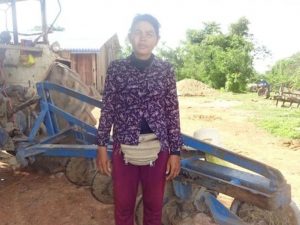 Assistant Programme Director Prosperity, Shukla Chattopadhyay
Assistant Programme Director Prosperity, Shukla Chattopadhyay
Contact her on apdprosperity@sigbi.org
Prosperity and the environment
The links between prosperity and the environment are many and complex: the environment provides resources to the economy, and acts as a sink for emissions and waste. Poor environmental quality (and climate) in turn affects economic growth and wellbeing by lowering the quantity and quality of resources (livestock and crops) and affects our health.
We are hearing a great deal in the news about environmental issues and the challenges of climate change, but what is equally important and deserving of more attention are the plans to fix them. In 2015, the world came together around an ambitious vision for a safer, healthier, and more prosperous world by 2030. That agenda, was set out in the 17 Sustainable Development Goals (SDGs). It was designed intentionally to show a new way to approach change, weaving together economic, social, and environmental dimensions, while acknowledging that decisions in one area impact others and have both synergies and trade-offs which need to be considered.
The 2030 Sustainable development agenda is structured around the five pillars of; People, Prosperity, Planet, Partnerships and Peace (5Ps). The 5 Ps highlight how the SDGs are an intertwined framework instead of a group of isolated goals. Progress on one P must balance and support progress on others.
Of the 17 SDGs, the following are linked to prosperity:

The aim is to “ensure that all human beings can enjoy prosperous and fulfilling lives and that economic, social, and technological progress occurs in harmony with nature.”
Inequality is one of the defining issues of this generation and one which requires more focus. Partly as a result of the Covid pandemic, trends toward achieving a shared prosperity have declined, as the world struggles with a slowing economy and rising inequality. Progress on decent work has also slowed.
Soroptimist projects supporting prosperity and the environment
Soroptimists supporting Fairtrade – The climate crisis is an immediate and ever-increasing threat to the livelihoods of farmers and workers across the world, from deforestation and changing weather patterns to rising temperatures, water scarcity and contamination.
Despite contributing the least to the climate crisis, smallholders in developing countries are disproportionately affected and have fewer resources to adapt to changes in climate and other stresses. These farmers, many are women, manage over 80 percent of the world’s 500 million farms and rely on this land for their livelihoods. With increasingly negative effects on land and agricultural production, farmers say that climate change is their biggest challenge right now.
By 2050 as much as 50 percent of the global surface area currently used for coffee farming may no longer be suitable and many cocoa growing regions in Ghana and Côte d’Ivoire, who produce over half of the world’s cocoa, could become too hot to grow the crop.
https://www.fairtrade.org.uk/get-involved/current-campaigns/fairtrade-fortnight/
 Soroptimists reducing the carbon footprint – Soroptimists in Winchester partnered with a club in Kenya to provide funds to renovate the makeshift kitchen in the community school.
Soroptimists reducing the carbon footprint – Soroptimists in Winchester partnered with a club in Kenya to provide funds to renovate the makeshift kitchen in the community school.
Improved stoves make cooking quicker, safer and cleaner. Energy-efficient stoves reduce air pollution, allow for more efficient cooking, provide employment opportunities and prevent widespread deforestation. The stoves can be an inexpensive means of slowing climate change. It is easy to construct, and it uses low-cost, locally available materials. Expenditure on fuel will be reduced by more than half in the Smiling School community.
This will go a long way to reduce the carbon footprint of The Smiling School community since the stoves will address three key environmental and health issues: deforestation, indoor air pollution and women’s and children’s health
https://www.facebook.com/Soroptimist-International-Club-of-Kisumu-1020656301345606/

Soroptimists giving microloans to women – Microloans provide entrepreneurs in underserved communities with the means to grow their business. Microloans promotes women’s leadership by empowering women who might not otherwise have access to money to make spending decisions.
Providing microloans (via specialist organisations such as Lend With Care) to women entrepreneurs in countries such as Zambia, Cambodia, Ecuador, Malawi, Pakistan and Vietnam, Soroptimists have helped them set up community shops and businesses. Others are farmers who have bought equipment, seed crops, goats or cows. They have been enabled to generate income and to feed their families, educate their children as well as helping their community by providing local jobs and services.
Get involved, join Soroptimists and make a difference.
See what Clubs are doing in the other Programme Areas:
- People – SDGs 1-5
- Planet – SDG6 and 12-15
- Peace – SDG 16
- Partnership – SDG17.


